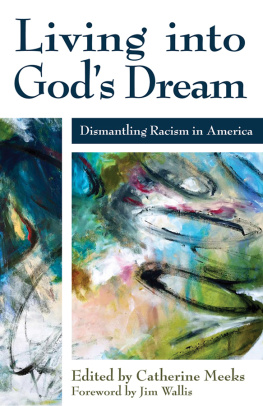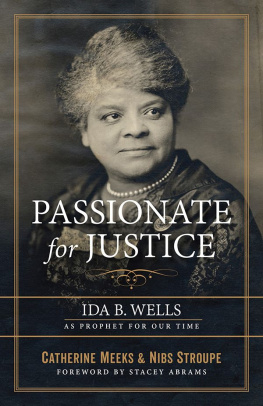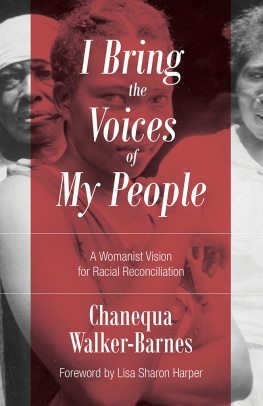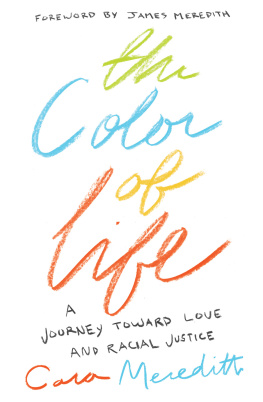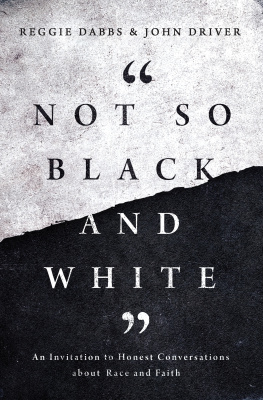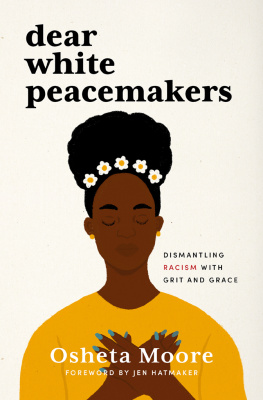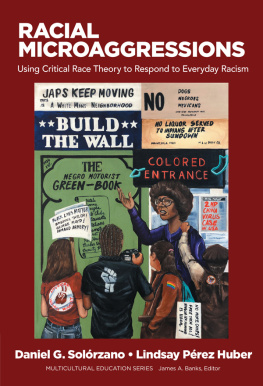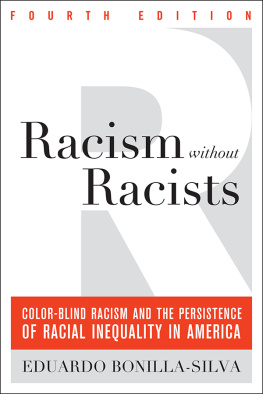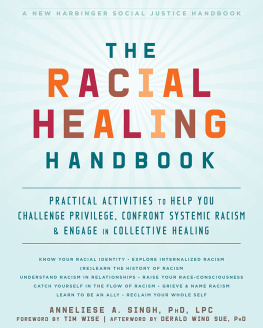Living into Gods Dream
Dismantling Racism in America
Edited by Catherine Meeks
Foreword by Jim Wallis

Dedication
To Malissa Alberta Jackson Meeks, my mother who taught me revolutionary patience.
To Bishop Michael Curry in appreciation for your courageous leadership.
Copyright 2016 by Catherine Meeks
All rights reserved. No part of this book may be reproduced, stored in a retrieval system, or transmitted in any form or by any means, electronic or mechanical, including photocopying, recording, or otherwise, without the written permission of the publisher.
Unless otherwise noted, the Scripture quotations contained herein are from the New Revised Standard Version Bible, copyright 1989 by the Division of Christian Education of the National Council of Churches of Christ in the U.S.A. Used by permission. All rights reserved.
Morehouse Publishing, 19 East 34th Street, New York, NY 10016
Morehouse Publishing is an imprint of Church Publishing Incorporated.
www.churchpublishing.org
Cover painting by Roger Hutchison
Cover design by Laurie Klein Westhafer, Bounce Design
Typeset by Denise Hoff
Library of Congress Cataloging-in-Publication Data
A record of this book is available from the Library of Congress.
ISBN-13: 978-0-8192-3321-9 (pbk.)
ISBN-13: 978-0-8192-3322-6 (ebook)
Contents
Jim Wallis
Catherine Meeks
Luther E. Smith Jr.
Lerita Coleman Brown
Catherine Meeks
Catherine Meeks
Don Mosley
Diane DSouza
Lynn W. Huber 107
Robert C. Wright
Beth King and Catherine Meeks
A s I sit down to write the foreword to this timely and urgently needed collection of essays, I can report with a sense of hope that new conversations with commitments to action on racism are happening in communities all over the country. Catherine Meeks, the editor of this important volume and my dear friend over many years, was a leader in several of those conversations in Atlanta.
Catherine has been a leader in the struggle for racial justice for a long time, and I am proud to have called myself one of her allies for many years. She has masterfully compiled a deep, probing, and honest collection of essays on how people of faith and conscience of all ethnicities can work together to dismantle racism in America. Her writing, and that of her fellow authors, is moving, thoughtful, and courageous.
In January 2016, I embarked on a town hall tour around my latest book, Americas Original Sin: Racism, White Privilege, and the Bridge to a New America. As someone who has worked on racial justice for the last fifty yearsand as someone who has witnessed with dismay the incredibly polarized conversation occurring at the national levelI did not know entirely what to expect.
I strongly believe that truth-telling about Americas original sin of devaluing Black and indigenous livesand the way that sin still lingers in so many of our systems todaymust be a multiracial vocation and that the commitment to action that must follow from these conversations must also be multiracial. I had many questions. Are White people ready to hear a call to repent racism and the false idol of whiteness? Will White Christians, in particular, be ready to hear that they are called to be more Christian than White? Will people of color feel safe and empowered to lead and speak honestly about these painful issues in town hall settings?
What I found made me start to feel some hope in our ability to have these difficult, uncomfortable, and necessary conversations. In St. Louis, Chicago, New York, Baltimore, and many other cities, these conversations were already happening, and new discussions are emerging and being led by young leaders and activists of all ethnic backgrounds. These powerful experiences have continued in cities all across the country. The most common thing I heard from those who came was that they were inspired and ready to act.
But in spite of this, the task of having these conversations and building a commitment to action toward racial justice and healing in the United States is far from over. So we must continue to go deeper into these transforming questions, and bring them to all corners of our country. Powerful voices of leaders and scholars of color must continue to be lifted up, with honest responses from, as Ta-Nehisi Coates so brilliantly puts it, those Americans who believe that they are white. With each conversation we must go deepergaining new insights, language, and examples from which to draw.
And thats why this collection of essays is so valuable.
Living into Gods Dream starts way back in the first chapter of Genesis when God says, Let us make humankind in our image, according to our likeness and all of us were created in the image of God. It ends in the seventh chapter of the book of Revelation where all of us, in our own tribes and languages and in all of our rich diversity, are worshipping God together. We are still very much in the midst of the fulfillment of Gods dream, but it is deeply satisfying that, even in the face of our pain and struggle, we have seen that dream and believe it will shape the end of human history. This book not only reveals the problems we still face but opens up the changes in hearts, minds, and policies that will take us forward. The essays are both prophetic and practical.
Together, Catherine and her colleagues are proposing real solutions to move us ever closer to the dream of the Beloved Community envisioned by Martin Luther King Jr. I am proud to continue standing beside Catherine as we pursue a nation where Gods dream can change our lives, our churches, our communities, our nation, and Gods world. I hope you will join us.
Jim Wallis
Washington, D.C., June 15, 2016
___________________
Ta-Nehisi Coates, Between the World and Me (New York: Spiegel and Grau, 2015), 6.
Catherine Meeks
H ow can African Americans and Whites build a foundation that will allow for honest and fruitful conversation? Is it possible to build enough trust between Blacks and Whites for authentic relationships to develop? What do White people need to consider who want to be conscious about racism and its role in the destruction of African American life in America? What do African Americans need to do now? How can our faith and spiritual journeys inform the work of dismantling racism?
These are some of the questions that frame the conversation being forged within this book. Each contributor is quite clear about the need for a different conversation on race in the twenty-first century than the one held in the twentieth century. But they are equally as clear about the difficulty in trying to discern what that conversation needs to encompass and the challenge surrounding the effort to bring Blacks and Whites together to engage one another in dialogue.
The loud cry that this is not your mothers civil rights movement is not lost on us. We know that the times are different, but we know that there are threads in the current struggle that are not that different at all from the ones of the past. The deep need for authentic dialogue continues. Also, there is a need for overt resistance just as fifty years ago when so many courageous warrior men and women took to the streets. At the present time a major challenge offered to any who will dare to engage in active resistance seems to be when and how to enter into the liberation struggle.

